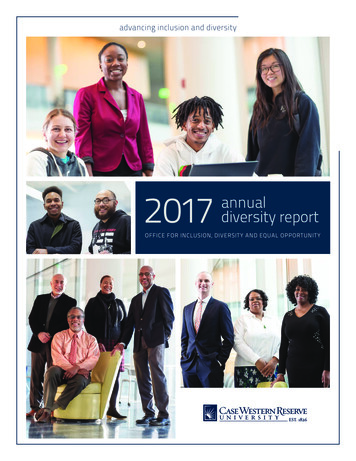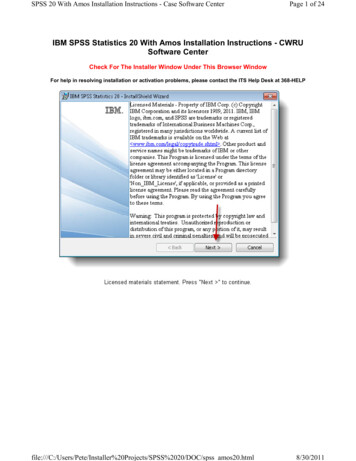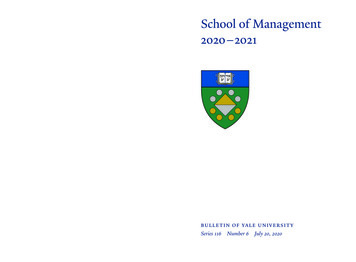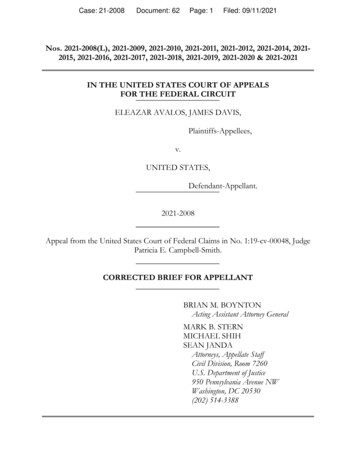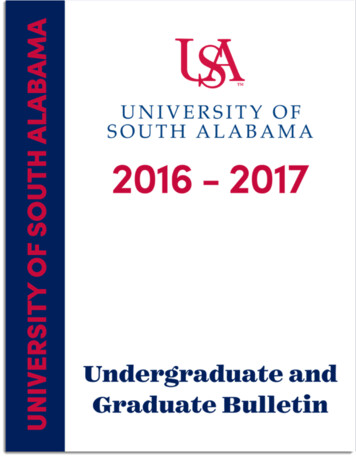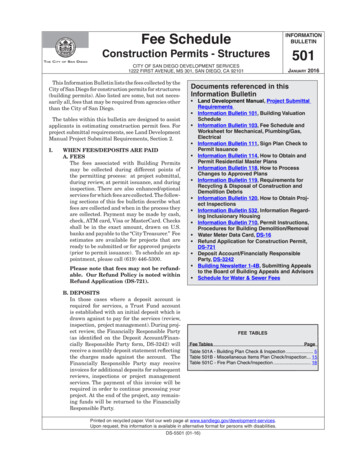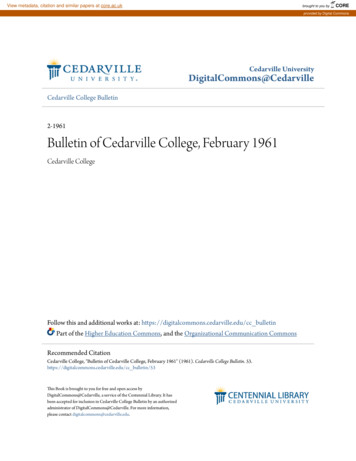
Transcription
2020-2021 CWRU SCHOOL OFENGINEERING BULLETINCase School of Engineering . 2Biomedical Engineering . 22Chemical and Biomolecular Engineering . 48Civil Engineering . 59Computer and Data Sciences . 68Electrical, Computer, and Systems Engineering . 93Macromolecular Science and Engineering . 128Materials Science and Engineering . 146Data Science and Analytics / Applied Data Science . 165Mechanical and Aerospace Engineering . 170Division of Engineering Leadership and Professional Practice . 189Engineering Physics . 191Master of Science in Engineering, Undesignated . 193Index . 194
2Case School of EngineeringCASE SCHOOL OFENGINEERINGEngineering seeks to create new processes, products, methods,materials, or systems that impact and are beneficial to our society.To enable its graduates to lead the advancement of technology, theCase School of Engineering (http://engineering.case.edu/) offersfourteen degree programs at the undergraduate level (twelve engineeringdegrees, plus the BS in computer science and the BS in data scienceand analytics). At the post-graduate level, the School of Engineeringoffers Master of Science programs and the Doctor of Philosophy foradvanced, research-based study in engineering. The Case School ofEngineering offers two specialized degrees at the master’s level: a Masterof Engineering specifically for practicing engineers, and an integratedMaster of Engineering and Management jointly administered with theWeatherhead School of Management. The Case School of Engineeringalso offers two dual-degrees at the graduate level jointly administeredwith the School of Medicine: a Doctor of Medicine/Master of Scienceand a Doctor of Medicine/Doctor of Philosophy. The faculty andstudents participate in a variety of research activities offered through thedepartments and the interdisciplinary research centers of the university.At the core of its vision, the Case School of Engineering seeks to setthe standards for excellence, innovation, and distinction in engineeringeducation and research prominence.Statement of Educational PhilosophyThe Case School of Engineering prepares and challenges its studentsto take positions of leadership in the professions of engineering andcomputer science. Recognizing the increasing role of technology invirtually every facet of our society, it is vital that engineering studentshave access to progressive and cutting-edge programs stressing fiveareas of excellence: Mastery of fundamentals Creativity Societal awareness Leadership skills ProfessionalismEmphasizing these core values helps ensure that tomorrow’s graduatesare valued and contributing members of our global society and that theywill carry out the tradition of engineering leadership established by ouralumni.The undergraduate program aims to create life-long learners byemphasizing engineering fundamentals based on mathematics, physical,and natural sciences. Curricular programs are infused with engineeringinnovation, professionalism (including engineering ethics and the roleof engineering in society), professional communications, and multidisciplinary experiences to encourage and develop leadership skills.To encourage societal awareness, students are exposed to and havethe opportunity for in-depth study in the humanities, social sciences,and business aspects of engineering. Undergraduate students areencouraged to develop as professionals. Opportunities include theCooperative Education Program, on-campus research activities, andparticipation in the student chapters of professional societies. Graduatesare prepared to enter the workforce and be strong contributors aspracticing engineers or continue for advanced study in engineering.At the graduate level, the Case School of Engineering combines advancedclassroom study with a rigorous independent research experience leadingto significant results appropriate for publication in archival journals and/or presentation at leading technical conferences. Scientific integrity,engineering ethics, and communication skills are emphasized throughoutthe program.Brief HistoryThe Case School of Engineering was established on July 1, 1992, by anaction of the Board of Trustees of Case Western Reserve University as aprofessional school dedicated to serving society and meeting the needsof industry, government and academia through programs of teaching andresearch.The Case School of Engineering continues the tradition of rigorousprograms based on fundamental principles of mathematics, scienceand engineering that have been the hallmark of its two predecessors,the Case School of Applied Science (1880) and the Case Institute ofTechnology (1947). The formation of the Case School of Engineering is are-commitment to the obligations of the gift of Leonard Case, Jr., to servethe citizens of Northern Ohio. The Case School of Engineering has been aleader in many educational programs, being the first engineering schoolto offer undergraduate programs in computer engineering, biomedicalengineering, polymer engineering, and systems and control engineering.StatisticsEnrollment Statistics by Degree Program (Fall 2015 through Fall2019). Data reflects sophomore, junior and senior declared Majors.CSE Degree Fall 2015ProgramFall 2016Fall 2017Fall 2018Fall ng5456442630ComputerScience(BA and Engr5352493841MechanicalEngineering291309303303285
EngineeringPolymerScienceand Engr7373554140Systemsand ControlEngr1518201717Graduation Statistics by Degree Program(AY 2015-16 through AY 2019-20)CSE Degree 2015-16Program2016-172017-182018-192019-20Marc Buchner, PhD(Michigan State University)Associate Dean of AcademicsSunniva Collins, PhD(Case Western Reserve University)Associate Dean of Professional Graduate ProgramsDaniel Ducoff, MS(University of California, Berkeley)Vice Dean for External Relations of the Case School of EngineeringCena Hilliard, MS (University of Wisconsin-Madison), MBA (CWRU)Associate Dean of Finance, Administration, and Business 24221111BA inComputerScience1635262542Kurt R. Rhoads, PhD, PE(Stanford University)Faculty Director of the First-Year Engineering ExperienceBS inComputerScience4365549087Chris Zorman, PhD(Case Western Reserve University)Associate Dean of Research1Degrees GrantedDataScienceandAnalyticsDeborah J. Fatica, MA(Bowling Green State University)Assistant Dean of the Division of Engineering Leadership and ProfessionalPracticeK. Peter D. Lagerlof, PhD(Case Western Reserve University)Faculty Director of Program Evaluation and AssessmentBachelor of Science in Computer Science (p. cs411988111GeneralEngineeringMaterialsScienceand lymerScienceand Engr2429221220Systemsand ControlEngr6Bachelor of Arts in Computer Science (p. 71) (granted by the Collegeof Arts and Sciences and administered by the Department of Computerand Data Sciences)Bachelor of Science in Data Science and AnalyticsBachelor of Science in Engineering with the following major fielddesignations: Aerospace Engineering (p. 174) Biomedical Engineering (p. 31) Chemical Engineering (p. 49) Civil Engineering (p. 61) Computer Engineering (p. 97) Electrical Engineering (p. 93)35AdministrationVenkataramanan Balakrishnan, PhD(Stanford University)Charles H. Phipps Dean of the Case School of Engineering46 Engineering Physics (p. 191) Materials Science and Engineering (p. 149) Mechanical Engineering (p. 174) Polymer Science and Engineering (p. 132) Systems and Control Engineering (p. 97)Bachelor of Science in Engineering with a major in General eering/generalengineering/) (forprograms that emphasize interdisciplinary areas or for programs thatinclude some emphasis on non-technical fields)Bachelor of Science in Engineering/Master of Engineering3
4Case School of EngineeringBachelor of Science in Engineering/Master of Science Aerospace Engineering Biomedical Engineering Chemical Engineering Civil Engineering Computer Engineering Computing and Information Science Electrical Engineering Materials Science and Engineering Mechanical Engineering Polymer Science and Engineering/Macromolecular Science andEngineering Systems and Control EngineeringMaster of Engineering (practice-oriented program)Master of Engineering and ManagementMaster of Science with the following major field designations: Aerospace Engineering (p. 178) Biomedical Engineering (p. 37) Macromolecular Science and Engineering Materials Science and Engineering Mechanical Engineering Systems and Control EngineeringDoctor of Medicine/Doctor of Philosophy with the following major fielddesignations: Biomedical Engineering Mechanical EngineeringEngineering MinorsStudents enrolled in other majors may elect to pursue a minor. Theminor program advisor's approval is required. The successful completionof a minor will be indicated on a student's transcript. For a full list ofengineering and university minors, go to the Office of UndergraduateStudies majorsminors/) website.List of MinorsEngineering Minors Biomedical Engineering Chemical Engineering (p. 54) Chemical Engineering Civil Engineering (p. 64) Civil Engineering Computer Engineering engcompsci/#graduatetext) Computer Engineering Computing and Information Science (p. 79) Electrical Engineering Electrical Engineering (p. 106) Macromolecular Science and Engineering (p. 136) Materials Science and Engineering (p. 153) Mechanical Engineering (p. 178) Systems and Control Engineering (p. 106)Master of Science with the following major field designations and optionaltrack: Biomedical Engineering:-Translational Health Technology Macromolecular Science and Engineering: -Fire Science and Engineering Mechanical Engineering:-Fire Science and EngineeringMaster of Science in Engineering,(Undesignated) (p. 193)Doctor of Medicine/Master of Science Biomedical EngineeringDoctor of Philosophy with the following major field designations: Aerospace Engineering Biomedical Engineering Chemical Engineering Civil Engineering Computer Engineering Computing and Information Science Electrical Engineering Computer Science Materials Science and Engineering Polymer Science and Engineering Systems and Control EngineeringUniversity Minors Artificial Intelligence (p. 71) Applied Data Science (p. 165) Computer Gaming (p. 71) Mechanical Design and Manufacturing (p. 174)Bachelor of Science in EngineeringIn addition to the major department requirements, each engineeringundergraduate degree program includes the Engineering Core(Engineering General Education Requirements), which providesa foundation in mathematics and sciences as well as aspects ofengineering fundamentals for programs in engineering. The EngineeringCore is also designed to develop communication skills and to providea body of work in areas of study outside of engineering, science, andmathematics. Requirements of the Engineering Core can be found in theUndergraduate Studies degree/) section of this bulletin.Details of the specific curricular requirements for the undergraduatemajors are described in the respective departmental descriptions. Detailsof the requirements of the general engineering undergraduate degree aredescribed under the General Engineering description.
EngineeringBachelor of Science in Engineering/Master of ScienceThe integrated BS/MS program is intended for highly motivated andqualified undergraduate students who wish to pursue an advanceddegree. Students admitted to the program may, in the senior year, take upto nine credits of graduate courses that will count toward both BS andMS requirements.Bachelor of Science in Engineering/Master of EngineeringStudents who have received a BS degree in engineering or computerscience from the Case School of Engineering, and who are accepted foradmission into the Master of Engineering (ME) degree program withina period of 24 months after graduation, are entitled to transfer up to6 credit hours of course work from their BS degree to their ME degreeprogram.online distance-learning format to minimize disruption at the workplaceand home. Because the program makes extensive use of computers,participants need to have access to computer facilities.For more details about the exclusively online Master of Engineeringdegree program, visit online-engineering.case.edu/masters/ (http://online-engineering.case.edu/masters/).For local students wanting to take on-campus technical electives, pleasecontact the Program Director, Sunniva Collins (skr@case.edu).CurriculumThe program consists of a set of six core courses and a four-coursetechnical elective sequence (a total of 30 credit hours are required).The core courses provide a common base of study and experiencewith problems, issues, and challenges in the engineering businessenvironment. The technical elective sequence provides an opportunityto update disciplinary engineering skills and to broaden interdisciplinaryskills. Up to six transfer credits may be approved for graduate-levelcourses taken at Case Western Reserve or another accredited university.The courses to be considered for transfer should be specified at the timeof application to the ME program, and require approval by the director ofthe Master of Engineering Program and the Dean of Engineering. Onceapproved, a request for an internal transfer of credit will be sent to theRegistrar, and these courses will be included in the student’s AcademicProgram for the ME degree.Core CoursesMaster of EngineeringThe Master of Engineering Program is a graduate degree program thattargets engineers currently employed in industry. The objective of thisprogram is to provide engineers in industry with technical as well asbusiness, management, and teamwork skills. The program differs froma traditional Master of Science degree in engineering by combiningcore courses that focus on the engineering-business environment andtechnical elective courses that concentrate on contemporary industrialpractice rather than on research.The Master of Engineering Program prepares students to enhancetheir role as corporate leaders and provides an environment in whichpracticing engineering professionals can address the increasinglywide range of technical, management, financial and interpersonal skillsdemanded by an ever-expanding and diverse global industry base.The Master of Engineering Program requires 30 credit hours ofcoursework that include 18 credit hours of online core courses and 12credit hours of technical electives, taken either online or on-campus, thatare chosen from focus areas (see below). It is possible to complete theMaster of Engineering degree program within a two-year (six semester),part-time, program of study, although most students choose to completethe program over a seven to nine semester period.The program is composed of online and traditional on-campus classes,with core courses aimed at equipping participants with knowledge onhow engineering is practiced in contemporary industry, and technicalelectives that provide depth in a chosen specialty area. All core coursesare provided in an exclusively online format. The technical electivesequences for Applied Data Science (ADS), Biomedical Engineering(EBME), Engineering Innovation, Management and Leadership (EIML),Mechanical Engineering (EMAE) and Systems & Control Engineering(SCS) are also in an online format. Other technical elective coursesare held on campus in the late afternoon or evening hours, and in an5EPOM 400Leadership and Interpersonal Skills3EPOM 401Introduction to Business forEngineers3EPOM 403Product and Process Design andImplementation3EPOM 405Applied Engineering Statistics3EPOM 407Engineering Economics andFinancial Analysis3EPOM 409Master of Engineering CapstoneProject3Total Units18Technical ElectivesFour courses are chosen from concentration areas.Concentration in Biomedical EngineeringEBME 401DBiomedical Instrumentation andSignal Processing3EBME 406Polymers in Medicine3EBME 410Medical Imaging Fundamentals3EBME 421Bioelectric Phenomena3EBME 432Quantitative Analysis ofPhysiological Systems3EBME 440Translational Research forBiomedical Engineers3EBME 451Molecular and Cellular Physiology3EBME 471Principles of Medical Device Designand Innovation3Concentration in Engineering, Innovation Management &LeadershipEPOM 410Intellectual Property Managementand Opportunity Assessment3EPOM 411Innovation - the Confluence of Need,Requirements and Creativity3
6Case School of EngineeringEPOM 412Technology Transfer andCollaboration3IIME 432Operations Research and SupplyChain Management3EPOM 413Innovation, Strategy & Leadership:Contemporary Approach to FutureGrowth3IIME 440Six Sigma and Quality Management3IIME 450Engineering Entrepreneurship3IIME 475Technology Marketing Strategy3Concentration in Mechanical EngineeringEMAE 450Advanced Mechanical EngineeringAnalysis3EMAE 456Micro-Electro-Mechanical Systemsin Biology and Medicine (BioMEMS)3EMAE 460Theory and Design of Fluid PowerMachinery3EMAE 480Fatigue of Materials3EMAE 481Advanced Dynamics I3EMAE 487Vibration Problems in Engineering3EMAE 494Energy Systems3Concentration in Systems & Control EngineeringECSE 401Digital Signal Processing3ECSE 404Digital Control Systems3ECSE 408Introduction to Linear Systems3ECSE 416Convex Optimization forEngineering3ECSE 468Power System Analysis I3Master of Engineering and ManagementThe Master of Engineering and Management (MEM) program providesthe business context and leadership skills needed to uniquely positiongraduates for rapid advancement in technology-orientated organizations.MEM is the result of years of research and interviews with over 110professionals and twenty-eight corporations across the country. Thisinterdisciplinary, joint degree program combines the problem-solvingrigor of the Case School of Engineering and the organizational insightsof the Weatherhead School of Management. MEM is a 1 year, lock-stepprogram that starts every year in June. This program is designed forengineering majors only and is focused on developing the high-impacttalent companies are actively seeking. Students can enter this programafter their junior year or upon graduation.CurriculumIIME 476 - Applied Statistics for Data Science - Summer2020Total Units330Elective Courses (6 credit hours)IIME 411New Venture FinanceIIME 415Materials and ManufacturingProcessesIIME 419Entrepreneurship and PersonalWealth CreationIIME 424Chief Executive OfficerIIME 435Enterprise Resource Planning in theSupply ChainIIME 446Models of Health Care Systems (*)IIME 447Regulatory Affairs for theBiosciences (*)IIME 472BioDesignIIME 473Fundamentals of ClinicalInformation SystemsDSCI 451Exploratory Data ScienceDSCI 452Applied Data Science ResearchDSCI 453Data Science: Statistical Learning,Modeling and PredictionMGMT 467Commercialization and IntellectualProperty ManagementMKMR 408Marketing MetricsOPMT 475Supply Chain LogisticsORBH 450Executive LeadershipORBH 491Leadership in Diversity andInclusion: Towards a GloballyInclusive Workplace*courses are 1.5 credit hours and are generally takentogether in one semester.Master of ScienceThe program includes 36 credit hours of graded coursework. The 10course core sequence makes up 30 of the required credit hours. Forthe remaining 6 credit hours, students can choose from any 400 levelCase School of Engineering course for which prerequisites are met orselect Weatherhead School of Management courses. Below is the list ofrequired core courses and a representative sample of elective courses.Recognizing the different needs and objectives of resident and nonresident graduate students pursuing the master’s degree, three differenttracks are offered. In all plans, transfer of credit from another universityis limited to six hours of graduate-level courses, taken in excess of therequirements for an undergraduate degree, approved by the student’sadvisor, the department chair, and the dean of graduate studies.Required Core Courses (30 credit hours)IIME 400Leadership Assessment andDevelopment (LEAD)3IIME 410Accounting, Finance, andEngineering Economics3IIME 425Understanding People and Changein Organizations3IIME 430AProduct Design and Development I3IIME 430BProduct and Process Design,Development, and Delivery II3By the end of the second semester of enrollment, all Master of Sciencedegree programs require an approved Planned Program of Study or adefined Academic Requirements Report, hereafter referred to as thestudent's Academic Program, via the Student Information System.Revisions must be submitted and approved via the Student InformationSystem when any change in the Academic Program occurs.A cumulative quality-point average of 3.0 or above in all courses takenfor credit as a graduate student at Case Western Reserve University
Engineering(excluding grades in thesis research and grades of R) is required for theaward of the master's degree.Online degrees (http://online-engineering.case.edu/) are available in thefollowing disciplines:The University requires all foreign applicants to show English Proficiencyby achieving a TOEFL score of at least 90 on the internet-based exam fora thesis-focused or a project-focused track. For a course-focused tracka minimum TOEFL score of 80 is required. If there is any professionalstudent to student interaction, e.g. as a teaching assistant, a labinstructor, or a tutor, then a minimum TOEFL score of 90 is required. Master of Engineering er’s Thesis-Focused Track Master of Science in Systems & Control Engineering um requirements for the degree of Master of Science in a majorfield under this plan include a total of 30 hours of coursework and thesiswork with the:1. Completion of at least 18 hours of graduate coursework at the 400level or higher. The courses must be approved by the departmentoffering the degree.2. Completion of at least 9 hours of thesis work culminating in a thesisexamination given by at least three professors, plus approval bythe chair of the department offering the degree. A student withresearch experience equivalent to a thesis may petition the GraduateCommittee of the Case School of Engineering for substitution ofnine hours of coursework for the thesis requirement. In this case,the thesis examination above is replaced by a similar examinationcovering the submitted research work and publications. Additionalrequirements may be specified by individual degree programs.Master’s Project-Focused TrackCompletion of 30 hours of approved coursework including three to sixhours of Special Problems. At least 18 (21) hours must be at the 400level or higher corresponding to a 6 (3) hour Special Problems coursework. Special Problems course work must consist of an engineeringproject approved by the chair of the department offering the degree andmay be carried out at the student’s place of employment with nominalsupervision by a faculty advisor or in the school's laboratories underdirect supervision. The project must culminate in a written report andexamination by at least three professors plus approval by the chairof the department offering the degree. The Special Problems coursemay be waived for students who have had industrial design or researchexperience and who submit sufficient evidence of this experience in theform of a publication or internal report. For these students, a minimumof 30 hours of coursework and the final oral examination covering thesubmitted publications or reports as well as related course material willbe required for the master’s degree.Master's Course-Focused TrackCompletion of 30 hours of approved coursework. At least 24 hours mustbe at the 400 level or higher, satisfactory completion of the culminatingcourse-focused experience, i.e. passing the course ENGR 600 withrequirements defined by the student's curricular program, and additionalrequirements as specified by the program. Students should consult withtheir academic advisor and/or department to determine the detailedrequirements within this framework.Distance EducationThe Case School of Engineering offers four graduate degree programsexclusively online, giving working engineers the opportunity to advancetheir careers from anywhere.7 Master of Science in Biomedical Engineering (https://onlineengineering.case.edu/biomedical/) Master of Science in Mechanical Engineering e programs are designed for working professionals and can becompleted in fewer than two years. All courses are taught by the samefaculty who teach graduate students on campus. With the same in-depth,rigorous content delivered in a convenient online format, students whoparticipate in the online programs receive the same robust education andtraining as traditional on-campus master’s students.Learn more and apply. (https://online-engineering.case.edu/)Additional Distance Learning OpportunitiesIn addition to the online-exclusive programs, the Case School ofEngineering offers select classes in its campus-based graduate degreeprograms in a convenient online format designed for students who needadditional flexibility.Learn more about available online courses. ance-learning/registration/)Doctor of Medicine/Master of ScienceMedicine is undergoing a transformation based on the rapid advancesin science and technology that are combining to produce moreaccurate diagnoses, more effective treatments with fewer side effects,and improved ability to prevent disease. The goal of the MD/MS inEngineering is to prepare medical graduates to be leaders in thedevelopment and clinical deployment of this technology and to partnerwith others in technology-based translational research teams. For furtherinformation, see the MD/MS Program in the Biomedical Engineeringgraduate section of this bulletin (p. 37). Interested students shouldapply through the biomedical engineering department.Doctor of PhilosophyThe student’s PhD program should be designed to prepare him or her fora lifetime of creative activity in research and in professional engineeringpractice. This may be coupled with a teaching career. The mastery ofa significant field of knowledge required to accomplish this purposeis demonstrated by an original contribution to knowledge embodiedin a thesis and by satisfactory completion of a comprehensive courseprogram which is intensive in a specific area of study and includeswork in other areas related to, but not identical with, the major field. Thenecessity for breadth as well as depth in the student’s education cannotbe overemphasized. To this end, any engineering department may addadditional requirements or constraints to ensure depth and breadthappropriate to its field.No student may be admitted to candidacy for the PhD degree beforeapproval of his or her Academic Program via the Student InformationSystem. After this approval has been obtained, it is the responsibility
8Case School of Engineeringof the student’s department to notify the dean of graduate studies ofhis or her admission to candidacy after the student has fulfilled anyadditional department requirements. Minimal requirements in addition tothe university requirements are:1. The minimum course requirement beyond the BS level is 36 credithours of courses taken for credit, at least 18 hours of which mustbe taken at Case Western Reserve University. The following coursestaken for credit will be acceptable for a PhD program of study:i. All 400-, 500-, and 600-level coursesii. Approved graduate-level courses taken at other institutions2. A minimum depth in basic science equivalent to six semester hours(for credit) is required. This requirement is to be satisfied by coursesthat have been previously approved by the faculty of the departmentin which the student is enrolled.3. The requirement for breadth is normally satisfied by a minimumof 12 semester hours of courses (for credit) outside the student’smajor area of concentration as defined by the student’s departmentand does not include courses taken to fulfill the basic sciencerequirement.4. A minimum of three teaching experiences as defined by the student’sdepartment. All programs of study must include departmental 400T,500T, and 600T courses to reflect this requirement. All studentsfulfilling teaching duties must complete UNIV 400A or UNIV 400B.5. The minimum requirement for research is satisfied by at least 18hours of thesis (701) credits.6. A cumulative quality-point average of 3.0 or above in all coursestaken for credit as a graduate student at Case Western ReserveUniversity (excluding grades in thesis research and grades of R) isrequired for the award of the doctoral degree.Qualifying Examinat
Cena Hilliard, MS (University of Wisconsin-Madison), MBA (CWRU) Associate Dean of Finance, Administration, and Business Operations Deborah J. Fatica, MA (Bowling Green State University) . Civil Engineering Computer Engineering Computer Science Electrical Engineering Materials Science and Engineering
